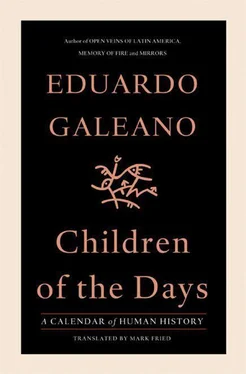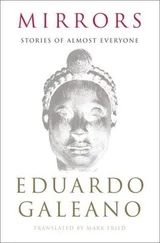Thus it went until early one morning when he and the other condemned men were dragged in chains to Semenovsk Square on the banks of the Neva.
The commanding voice shouted orders, and at the first command the gunmen blindfolded their victims.
At the second command, the click-clack of guns being cocked rang out.
At the third command of “Aim,” there were pleas, moans, a few sobs. Then silence.
And silence.
And more silence. Until, in that silence without end, they were told that the tsar of all Russia, in a magnanimous gesture, had granted them a pardon.
November 12. I DON’T LIKE IT WHEN THEY LIE TO ME
Sor Juana Inés de la Cruz, born today in 1651, was the best.
No one else flew so high in her place and her time.
She entered the convent very young, believing that it would be less of a prison than the home. She was misinformed. By the time she found out, it was too late. She died years later, having been condemned to silence, this the most articulate of women.
Her jailers liked to shower her with praise, which she never believed.
On one occasion a court painter, sent by the Mexican Viceroy, painted a portrait that was something like a forerunner of Photoshop. She replied:
This, in whom flattery has striven
to pardon the years of their horrors ,
and vanquishing time of its rigors
to defeat old age and oblivion ,
is a tedious mistaken errata ,
an empty yearning and, on close viewing ,
it’s cadaver, dust, shadow, nada .
November 13. THE FATHER OF MOBY-DICK
In 1851 the first edition of Moby-Dick was published in New York.
Herman Melville, a pilgrim on land and sea, had written a few successful books, but Moby-Dick , his masterpiece, never sold out its first printing and the books that followed met with no better fate.
Melville died in obscurity, having learned that success and failure are accidents of doubtful importance.
November 14. THE MOTHER OF FEMALE JOURNALISTS
On this morning in 1889, Nellie Bly set off.
Jules Verne did not believe that this pretty little woman could circle the globe by herself in less than eighty days.
But Nellie put her arms around the world in seventy-two, all the while publishing article after article about what she heard and observed.
This was not the young reporter’s first exploit, nor would it be the last.
To write about Mexico, she became so Mexican that the startled government of Mexico deported her.
To write about factories, she worked the assembly line.
To write about prisons, she got herself arrested for robbery.
To write about mental asylums, she feigned insanity so well that the doctors declared her certifiable. Then she went on to denounce the psychiatric treatments she endured, as reason enough for anyone to go crazy.
In Pittsburgh when Nellie was twenty, journalism was a man’s thing.
That was when she committed the insolence of publishing her first articles.
Thirty years later, she published her last, dodging bullets on the front lines of World War I.
November 15. HUGO BLANCO WAS BORN TWICE
The first time was in Cuzco in 1934.
Hugo Blanco arrived in a country split in two, Peru.
He was born somewhere in between.
He was white, but was raised in a town, Huanoquite, where the buddies he played and ran with spoke Quechua, and he went to school in Cuzco, where the sidewalks were reserved for decent folk, and Indians were not allowed on.
Hugo was born the second time when he was ten years old. In school he heard the news from his town that Don Bartolomé Paz had branded an Indian peon named Francisco Zamata with a red-hot iron. This owner of lands and people had seared his initials, BP, on the peon’s ass because he hadn’t taken good care of his cows.
The matter was not so uncommon, but it branded Hugo for life.
Over the years, this man who was not Indian became one. He organized peasant unions and paid the price for his self-chosen disgrace with beatings and torture, jail and harassment and exile.
On one of his fourteen hunger strikes, when he could go on no longer, the government was so moved it sent him a casket as a present.
November 16. AN EXAMINER OF LIFE
Being so nearsighted, he had no choice but to invent lenses that laid the foundations of modern optical science, as well as a telescope that discovered a new star.
And being a real gawker, he stared at a snowflake in the palm of his hand. He saw that its frozen soul was a six-pointed star, six, like the sides of the little cells in beehives. In his mind’s eye he saw that the hexagonal form is the best use of space.
From the balcony of his house he discerned that the voyage of his plants in search of light was not circular, and he deduced that perhaps the voyage of the planets around the sun was not circular either. His telescope went on to measure the ellipses they describe on the sky.
He lived his life looking.
When he stopped seeing he died on this day in 1630.
The gravestone of Johannes Kepler says:
“I measured the heavens. Now the shadows I measure.”
November 17. THE OTHER EAR
Brazilian composer Heitor Villa-Lobos died today in 1959.
He had two sets of ears, one facing in, the other facing out.
In the early years, when he earned his living playing piano in a Rio de Janeiro whorehouse, Villa-Lobos found a way to concentrate on his opus: he closed his outer ears to the cacophony of guffaws and drunkenness, and he opened his inner ears to the music being born, note by note.
Much later, those inner ears would become his refuge against insults from the public and poison from the critics.
November 18. ZORRO WAS BORN FOUR TIMES
For the first time in 1615. His name was William Lamport, and he was a redhead and Irish.
He was born again when he changed his name and his country. He became Guillén Lombardo, a Spaniard, captain of the Spanish Armada.
His third birth occurred when he became a hero of Mexico’s long struggle for independence. In the year 1659, sentenced to die at the stake, he hanged himself rather than face the dishonor of being burned alive.
He was resuscitated in the twentieth century. In his fourth life he called himself Diego de la Vega and he wore a mask. He was Zorro, sword-fighting champion of the downtrodden, who left his mark with a “Z.”
Douglas Fairbanks, Tyrone Power, Alain Delon and Antonio Banderas all wielded his sword in Hollywood.
November 19. THE MOSS AND THE STONE
At dawn on this day in 1915, Joe Hill faced a firing squad in Salt Lake City.
This foreign agitator, who had changed his name twice and his job and address a thousand times, had written the songs sung by striking workers all over the United States.
On his last night, he asked his comrades not to waste time crying for him:
My will is easy to decide ,
For there is nothing to divide .
My kin don’t need to fuss and moan ,
Moss does not cling to a rolling stone .
November 20. THINGS CHILDREN SAY
Today is Children’s Day.
I go for a stroll and bump into a girl who is two or maybe a little older, that age when we’re all pagans.
The girl is skipping along, greeting all the greenery she sees: “Hello, grass!” “Good morning, grass!”
Then she stops to listen to the birds singing in the tops of the trees. And she applauds.
At noon on this day, a boy of about eight, maybe nine, brings a present to my house.
Читать дальше












